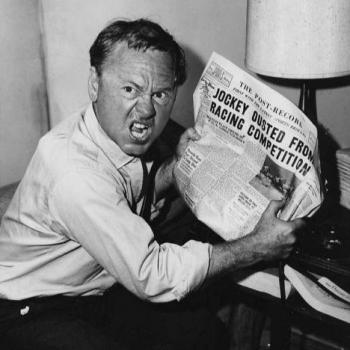
I had the pleasure of screening, Eddie the Eagle for Patheos last Wednesday.
It is a charming film and a heart-warming one. And it is based on real events. (You can read about the real Eddie Edwards here.) I enjoyed it, and anyone who shares my pleasure in over-achieving underdog sports films will like it too. If not for one scene, I would say it is a film the entire family can enjoy. Because of that one scene, you might find yourself feeling a little embarrassed if you are sitting with your kids.
Here’s a quick summary.
Eddie the Eagle! (Spoilers: beware.)
Eddie Edwards was a dreamer, and he didn’t allow a childhood handicap, or a dour but realistic father, or even lack of real talent keep him back. Eddie wanted to be an athlete, and he would not settle for being a weekend, pick up basketball, recreational athlete either. He was determined to be an Olympic athlete.
Eddie’s innocence, pluck, good-natured self-deprecation, and frankly, his powerful glasses that magnify his eyes and accentuate his gee-wiz, zest for life, all make him lovable. You can’t help but want him to succeed.
And this is a problem.
In his quest for greatness Eddie takes up skiing, and to the surprise of his blue collar parents, he enjoys a measure of success. He rises through the ranks, and is actually considered a contender for the British national team. But nevertheless, he is cut from the squad.
Cagily, Eddie tries a new strategy: ski-jumping. He’ll face no competition. England hasn’t had a ski jumper in the Olympics since the 1920s. This is the 1980s. All he needs to do is meet the minimum distance set by the Olympic Committee to qualify. Since he has no idea what he’s doing, things seem hopeless.
Enter Hugh Jackman.
Jackman plays a Marlboro smoking, whiskey flask tipping, Trans Am driving, ski-slope groomer. In other words, he plays an American. He does a good job of it too.
(Aussies are honorary Americans–far more so than Canadians–at least until they lost their gun rights, but that’s another story.)
But he also happens to be a washed-up ski jumper, one of the best in the world at one time. At one point in the film Jackman’s character jumps the 90 meters (the biggest jump) in blue jeans while smoking a cigarette, at night.
Jackman’s character takes a liking to Edwards and promises to help him. The rest is history as they say, culminating in Eddie’s triumphal last place finish at the Calgary Winter Olympic Games in 1988. (The very games that feature the Jamaican bobsled team.)
The relationship between Jackman’s character and Eddie is a nice foil for the whole film, playing the plucky but talentless Edwards against the gifted by sloshed Jackman. It gives you something to ponder.
As I said, it’s an enjoyable film. I recommend it.
But it made me think about more than the contrast between Jackman’s character and Eddie. It made me think about things I don’t have neat answers for. What follows is more dilemma than moralism. But here goes.
What to do with unrealistic dreams?
I’ve know lots of dreamers. Most of them had no chance.
In the film Eddie’s father plays the voice of reason. “Be a plasterer like me, son.” is his message. Of course, an unspoken contempt for the trades is the backdrop for this subplot. After all, who would want to settle for being a plasterer? Apparently Eddie shares the contempt.
(Anyone who knows me knows the contempt I feel for people who think they’re better than tradesmen.)
Okay, let’s admit that Eddie’s story ends happily. As I said, I’ve know many people who’ve not had that happen. Instead, I’ve known people who’ve felt let down, who’ve felt like failures, who’ve felt like they’ve wasted years on some quixotic nonsense, and who, in retrospect have sometimes said, “I just wish someone would have told me the truth.”
But these are the same people who scorned sensible fathers like Eddie’s.
For bystanders it presents us with a problem. Do you really want to be that guy–you know–the one who said it couldn’t be done and was proven wrong? Forget the uncomfortable fact that usually a dose of reality is not wrong. 99% of the time it’s right. But even so, who wants to hurt someone’s feelings and ruin a relationship?
Like I said, I’m not offering answers, just raising questions.
Is doing your best really good enough?
No, not if you’re a brain surgeon or a General in the army. In those settings the stakes are too high for settling for a good, but talentless effort.
I recall when my oldest son played T-ball. We signed him up late and since all the players had already been placed on teams with full rosters he was consigned to the “left-over” team.
This was actually a good thing since the other folk who signed up late tended to come from blue-collar homes. It proved to be a very boyish and talented bunch. (They were all boys, even though it was a co-ed league–the blue collar have not read the memo on gender neutrality.) All the eager-beaver white-collar families knew how to plan ahead and sign-up early. Their kids just stunk at baseball.
Even more fun was the fact that the only uniform left over for our team to use was the Yankees’ uniform. This was Cape Cod. When our little guys came on the field they were booed.
Of course, mommies rule in T-ball, which means keeping score was not allowed. When our boys asked, “Who won?” we’d have to break the news to them that there was no scoring. Everybody is a winner!
The boys wouldn’t settle for that though. Even as five and six year olds they knew they had the best team. They started to keep score on their own.
(I think the average victory was 30-1. Many of those boys went on to become members of the town all-star traveling team that I helped to coach years later.)
So what about that? Excellence and solidarity seem to pull us in opposite directions at times. Is group cohesion so important that we should discourage the gifted from distinguishing themselves?
We all owe a great deal to those loners who left the rest of us behind in order to pursue excellence in the arts and sciences. Sure, excellence in sport seems to be something we could manage without, but how about engineering? Do we want to discourage the people who design our bridges from doing their best because the less talented may feel bad if they do?
I hope this doesn’t come across the wrong way. I liked the film, and I think I would have liked Eddie if I had known him. But in some intriguing ways the film brings up tensions we all live with at work and school. If the film serves as a discussion starter on these themes, it will do more than entertain.















